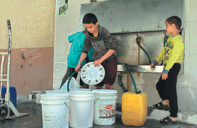Costly water adds to strains felt by Gazans

GAZA, Middle East-Buthaina Abu Ghaben has seen her daily expenses for fresh water double, especially during the holy fasting month of Ramadan, while living in the Al Shati refugee camp in the west of Gaza City.
Ramadan is a month when Muslims prepare many dishes and drink a lot of water after sundown. This is the reason why the 44-year-old mother of seven has to spend $10 for 500 liters of water a week.
"These expenses put a real burden on my family, which relies on a monthly salary of about $250, of which 20 percent goes to expenses for water and electricity," she said.
The woman relies on tap water for the rest of her daily housework, including showering, washing clothes and utensils, as well as cleaning the house. The problem is that tap water arrives just three days a week, so she has to store water in large pots.
The low quality of tap water also leads to health problems. It causes skin disease and hair damage, not to mention the fact that her utensils get corroded.
"If I use desalinated water for housework, I have to spend double what I earn a day, and this means we will all die of starvation," she said while finishing cooking iftar, a traditional meal that breaks the fast.
This crisis affects most families who live below the poverty line in the coastal enclave and suffer from difficult economic conditions due to the 14-year Israeli blockade.
Many families in similar conditions rely on charity organizations that set up water stations to distribute a daily basic. It has become a pricey commodity in Gaza.
One of those stations is opened in front of the mosque at Al Shati camp and it is where dozens of local children gather to fill their buckets and pots with water.
Amjad Al-Mashharawi is one of them. He arrives at the station early in the morning to make sure his family of 10 gets enough water. "This is free water that we are allowed to use without paying money because we are poor and cannot buy desalinated water," the 16-year-old said.
In an effort to provide safe water to Gazans, local authorities and private organizations have established desalination plants across the Gaza Strip.
Those facilities can ease the crisis, but not solve it.
There are about 220 private desalination plants in the strip, 70 percent of which are unlicensed and unattended and offer products below the required quality, said Ahmed Helles, an environmental expert from Gaza.
"About 2 million people have to choose either the water unsuitable for human use or the desalinated but expensive water," he said.
Xinhua

Today's Top News
- Lawmakers review draft law to expand childcare services
- China's new-style tea brands find a hot new market in US
- Xi extends congratulations to Chilean president-elect
- Japan urged to stop provocative moves
- Shanxi ends province-wide blanket fireworks ban
- Tech park set to lift GBA's development






























